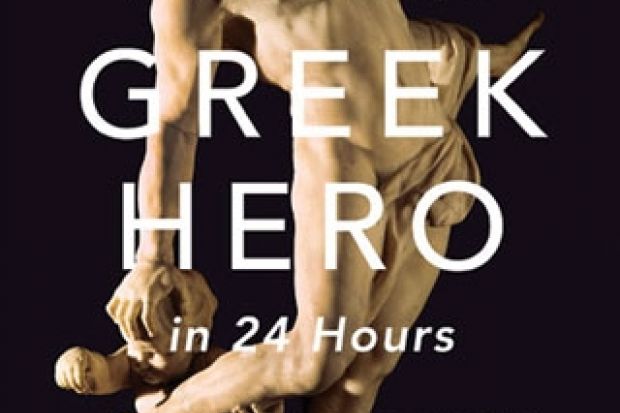The Ancient Greek Hero in 24 Hours is Gregory Nagy’s Mooc book. The massive open online course is one of the most significant developments in higher education in years and Nagy is one of the foremost Homerists of his generation, so the book deserves attention both as an academic publication and as a pedagogical experiment.
Scholars already familiar with Nagy’s work will not find radically new insights here. What they will appreciate is a systematic and exceptionally lucid statement of the research he has carried out over the past four decades (about a quarter of the bibliography is devoted to Nagy’s own work, as are most of the footnotes). The book comprises 24 chapters, each of which is meant to take one hour to read. This seems optimistic, given that the text runs to 7 pages, but I timed myself and think 48 hours (including the introduction and supplementary hours for “Hour 7”) is a more realistic estimate. How much can be absorbed in one straight reading is, however, a different matter. This is a densely packed book and one that repays slow consumption.
“The ancient Greek concept of hero”, starts Nagy, “goes beyond the word’s ordinary levels of meaning in casual contemporary usage.” It denotes “humans of the remote past, endowed with superhuman abilities and descended from the immortal gods themselves”. Like the gods, the heroes inspired worship. Ancient Greek communities sacrificed at the tombs of the heroes and prayed to them. They also listened to poems that exalted the great deeds of the heroes of old: the Homeric epics, but also shorter lyric compositions (for example, the songs of Sappho and Pindar). Nagy argues that myth and cult were intertwined, and at times antagonistic, ways of remembering the heroes. Poetry was Panhellenic in orientation: it preserved the “imperishable fame” (kleos aphthiton) of the heroes for all those who understood Greek. Ritual was, necessarily, a local affair. It framed myth (since poetry was performed at religious festivals) but could never aspire to the same universal appeal. It was by listening to shared poems about gods and heroes that the Greeks felt united, even while they lived in independent city states and followed different ritual calendars. One of the greatest achievements of Nagy’s research is that it powerfully illuminates the relationship between myth and cult.
Readers will also learn the importance of close reading and the necessity of learning Greek. Each “Hour” starts with a key Greek word, an explanation of its meaning and an investigation of how it is used in a selection of ancient texts. Linguistic analysis then gives rise to broader cultural considerations. Many classicists, especially Nagy’s own students, follow his linguistic/thematic approach and with excellent results. But it is not, of course, the only way to study ancient Greek culture: Mooc-takers (for whom this book, or its online equivalent, may constitute the only systematic introduction to classical scholarship) may not be in a good position to appreciate this. They will likewise be unable to check Nagy’s linguistic claims – which are always worthwhile, often dazzling and sometimes debatable. It would, in fact, make sense to learn ancient Greek first and then admire what Nagy can squeeze out of ancient Greek words. That is, however, unlikely to be the general approach: Nagy’s Mooc is far more popular than any online course in ancient Greek is likely to be.
There are, I think, three main reasons for its success. The first is the “imperishable fame” of the Greek heroes themselves, who never fail to attract attention. The second is institutional prestige: Nagy teaches at Harvard University, so taking his Mooc feels like eavesdropping on his Harvard lectures. The third is the pleasure of perceiving a great mind at work – for I have no doubt that even the uninitiated reader will catch something of Nagy’s remarkable creativity and insight. As to whether his Mooc book can actually replace a lecture course, I have my doubts. The Mooc spreads the fame of the ancient hero and also sings of Harvard and of Nagy – but kleos is not all that matters. Nagy himself would be the first to agree: he writes eloquently about the ritual context of ancient poetry. The face-to-face encounter, the live performance, the “I was there”, are quite different from reading a book or learning online.
The Ancient Greek Hero in 24 Hours
By Gregory Nagy
Harvard University Press, 752pp, £24.95
ISBN 9780674073401
Published 5 July 2013
Register to continue
Why register?
- Registration is free and only takes a moment
- Once registered, you can read 3 articles a month
- Sign up for our newsletter
Subscribe
Or subscribe for unlimited access to:
- Unlimited access to news, views, insights & reviews
- Digital editions
- Digital access to THE’s university and college rankings analysis
Already registered or a current subscriber?
